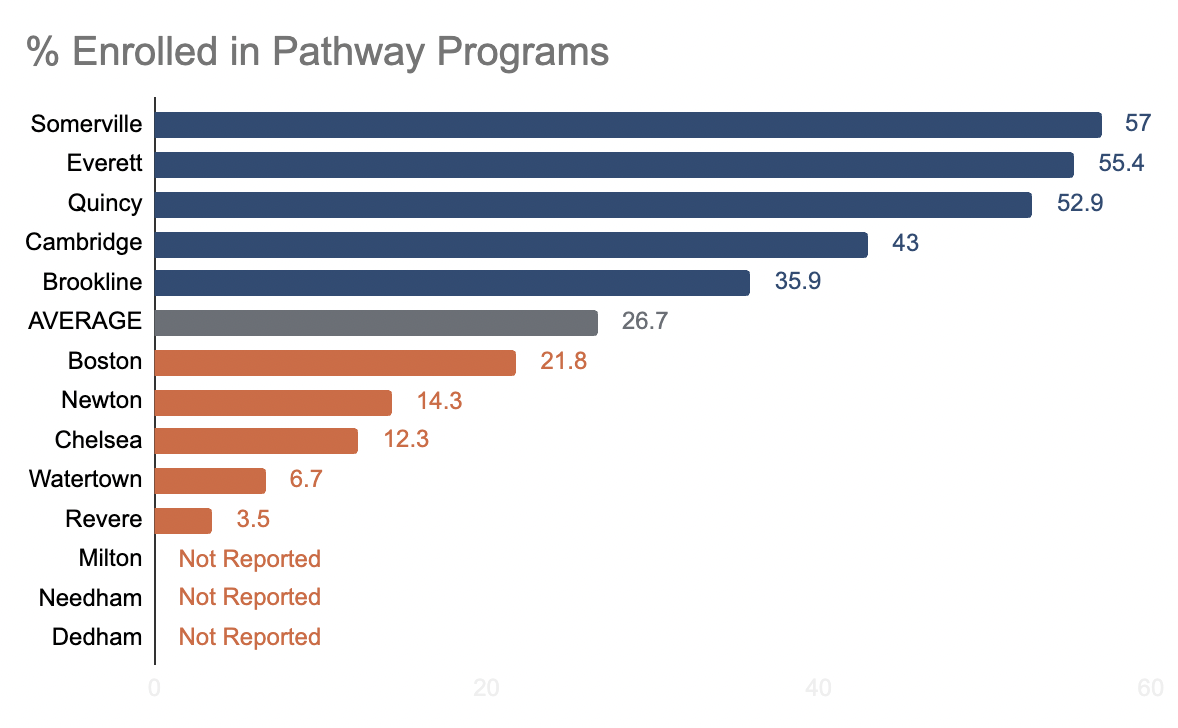FYI from BSF, 3.22.24
“Standards and accountability.”
“Whole-child.”
“Turnaround.”
"Human capital."
"Social and emotional learning."
Anyone who has followed education for the past three decades recognizes these terms less by their strict definitions, but more so as a reflection of a certain time and focus. The confluence of public policy and private dollars and non-profit organizations have a way of spreading practices across schools and school districts.
Recent history and data indicate we are now in the time of “pathways,” a broad term that encompasses high school programs that emphasize career and technical education and early college.
The Baker Administration began to subsidize early college enrollment in 2017. The Healey Administration also made moves in its first term, creating funding for “innovation career pathways” in 2023. State programs and funding for career and technical education is expansive and increasing. Pathways have been a central idea in Boston high school redesign, from the Chang superintendency’s proposal of Linked Learning, to the evergreen call to improve Madison Park (Boston’s lone vocational school), to the recently announced partnership between Mass General Brigham and Edward M. Kennedy Health Careers Academy. And there is a steady flow of promising data and research and public-private partnerships for further support.
So, it should not be surprising to learn that state data released last week shows increased enrollment by Massachusetts students in pathway programs (with Boston tracking the trend).
Adoption is varied. More than 10% of Massachusetts school districts - mostly regional vocational schools - have near 100% adoption. But more than half of Massachusetts school districts have less than 10% adoption or didn’t even report pathway enrollment.
Boston and its neighboring communities reflect this variation.
Even with political consensus, support, and funding, it will take some time for pathways to reach the ubiquity of preceding themes.
Adopted in 2007, MassCore is a state-created program of study for high school rigor and college and career readiness. Continuing through and beyond the previous era of “standards and accountability,” +83% of recent high school graduates in the Commonwealth completed MassCore.
In contrast to pathways, there is significantly less variation in adoption. ~70% of Massachusetts districts approach 100% graduation with MassCore completion. Only ~7% of Massachusetts school districts have less than the majority of its graduates completing MassCore.
Again, Boston and its neighboring communities reflect the more general trend.
Boston has made substantial strides recently, voting in 2021 to require MassCore for graduation and increasing completion by +20% in the past five years.
Time will tell if pathways will follow suit in Boston, and around the Commonwealth.
notes in the margin
Boston School Committee met on Wednesday. State funds will be pursued for the BLCA-McCormack project, the Student Opportunity Act plan is moving forward, and, with a final vote next week, more details on the FY25 budget. Full materials here.
Much of public comment and discussion concerned the move to inclusion, a central question of a whistleblower lawsuit that became public this week.
White Stadium is not the only Boston athletic complex receiving attention, as City Council held a hearing on the Reggie Lewis Center.
With data indicating that sadness is on the rise among Boston teens, the city is pledging more funds and staff for mental health.
Communities are experiencing - or bracing for - declines in municipal revenue and school budgets. Brookline, Pittsfield, Marblehead, and Billerica are a few examples of where staffing and program cuts are on the table. Expect more headlines and debate around overrides (Franklin is an example). Mayor Wu floated increasing commercial tax rates.
Governor Healey officially opposes the potential ballot initiative to remove the MCAS graduation requirement.
It may come to pass that one of the rites of spring will be pandemic reflection. The fourth anniversary of American school closures yielded another round-up of data in the New York Times. Among the many factors considered, income status and access to in-person schooling. Anyone who asserts that achievement is a simply function of students’ background should compare the two center bars below.
Other Matters
Four Boston schools brought home five state championships this week: the Cathedral boys’ and girls’ basketball teams, the New Mission boys’ basketball team, the Charlestown High boy’s basketball team, and the Boston Latin’s boys’ hockey team.
Hopefully the Celtics and the Bruins follow suit (no comment on the Red Sox or the Patriots).








